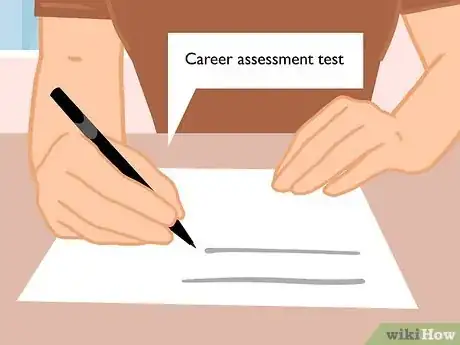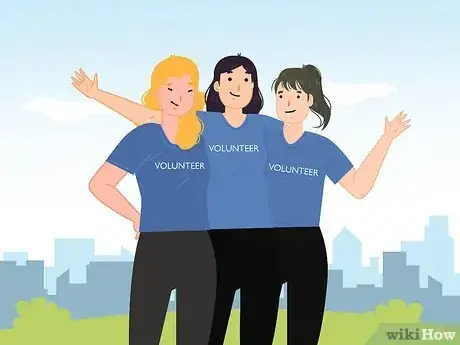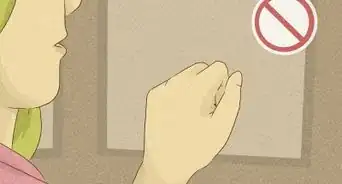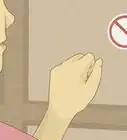This article was co-authored by Devin Jones. Devin Jones is the creator of “The Soul Career," an online career incubator for women. She is certified in the CliftonStrengths assessment and works with women to clarify their purpose and create meaningful careers. Devin received her BA from Stanford University in 2013.
This article has been viewed 12,987 times.
As your teenager nears the end of high school, they will begin thinking about careers. You want to encourage your child to explore their interests and passions to direct them on their career path after high school. Try to foster a solid sense of self in your teen so they can identify their passions. Help them research various career paths so they get a sense of the practical steps they should take to start their career. Allow your teen to gain experience working and volunteering, as this can help them identify what kind of work they enjoy.
Steps
Identifying Your Teen's Interests and Passions
-
1Brainstorm ideas together. When your first start talking about careers, brainstorm out loud with your teen. Talk about your teen's interests in a very general sense. From there, try to narrow things down to explore a variety of careers based around a broad interest. Together, write down a list of interests. From each interest, jot down potential career paths. You can come back to this list as you continue to explore your teen's career.[1]
- For example, say your child is interested in singing. Try asking questions like, "Would you want to do something with singing for a career? What kind of work do you think you can do with singing?" You can think of practical careers, like being a music teacher, while also considering pursuing more challenging paths, like singing professionally.
-
2Share your career story. Most people are unsure what they want to do with their lives when they're young. It can be helpful for your child to hear your personal career story. Let them know how you found yourself in your field and what guided you in that direction.[2]
- Talk to them about why you chose the path you did. For example, say you became a lawyer after witnessing a local scandal where a lawyer in your home town successfully advocated for worker's rights.
- Let them know what experiences and interests led you down your career road. For example, maybe being on the swim team in high school led you to become a PE instructor professionally. Hearing how you chose a career will help your teen find concrete ways to fuel their interests into a career.
- Encourage your teen to ask family members about their career stories as well.
Advertisement -
3Ask your teen about defining experiences. A good way to identify one's passions is to figure out what experiences define a person. Ask your teen to think about what experiences were most meaningful for them. Ask them something like, "What event do you think really defined who you are as a person? When was a time you learned something about yourself?"[3]
- The answer your teen gives will reveal something about their passions and interests. This can be helpful when it comes to choosing a career path for your teen.
- For example, maybe reading a particular book was very defining for your teenager. If a book had a huge impact on your teen's life, maybe they would love to work with literature. Talk about careers in editing, publishing, or teaching literature professionally.
-
4Consider your teen's strengths. Have your teen make a list of their top strengths and weaknesses. Talk to them about what careers would match well with your teen's skill set. For example, if your teen has strong analytical and mathematical skills, they could go into something like engineering.[4]
- However, let your teen know they can work on developing skills they feel they're lacking, especially if such skills are required for a career that interests them. Never discourage your teen from trying when identifying their strengths and weaknesses.
-
5Use classwork as a jumping off point. You can see what kind of homework your teen takes to and use this as a jumping off point to discuss careers. If your teen seems very interested in something at school, maybe your teen could pursue that interest for a career.
- For example, you see your teen is extremely invested in their science fair project. Ask them if they're interested in science as a career.
- Ask about the specifics of the project. What are they working on? Maybe it's a project involving food sciences. Your teen may want to work in food sciences professionally after graduation. Explore colleges where you teen can get a relevant degree.
-
6Identify your teen's life goals. Talk about broader life goals in addition to career goals. Where does your teen see themselves in, say, five years? Ten years? While teens will not have everything figured out, they may have a vague idea of the life they want. This can help them pinpoint potential careers.
- For example, if your teen wants to live in a particular type of area, like a city, talk about job opportunities in that area.
Researching Careers in Depth
-
1Talk to school counselors. Your teen's school counselor is there for a reason. School counselors can help teens identify potential career paths and have the training necessary to help your teen form a concrete plan.
- Call your school and request you and your teen have a meeting with the student counselor. The two of you can talk about potential career paths, and practical ways your teen can achieve their goals.
- Ask the career counselor how you can be supportive as a parent. There are probably many things you can do to assure your teen gets off to a good start with career planning out of high school.
- You can also ask counselors to put you in touch with relevant colleges and college recruiters. This can help your teen pursue the right education for their potential career.
-
2Make use of a local library. Encourage your teen to explore books on career planning at the school library. You can also take your teen to a local library to check out books and other resources on a variety of careers.
- Talk to a librarian and let them know you're looking for books on career planning. Librarians are trained to help people find the right resources to meet their goals, so take advantage of the librarian at your teen's school.
-
3Try a career assessment test. There are many career assessment tests you can find online. These are questionnaires a teen fills out regarding their interests and strengths. Such questionnaires will provide a list of possible careers after your teen finishes taking them.
- Many career assessment tests also provide databases at the end of the test highlighting potential careers, including information on career paths.
- These tests ask your teen a variety of questions about what interests and inspires them. Then, the tests will provide a list of potential careers.
- Make sure you're using a legitimate career aptitude test. There are many fraudulent or unreliable tests online, so ask your teen's career counselor for recommendations.
-
4Allow your teen to meet with people in various industries. Seek out help from your friends and family members. If your teen is interested in a particular career path, let them meet with professionals from that field.
- For example, say your child is interested in engineering. Maybe a friend's spouse works as an engineer. See if that person would be willing to meet with your teen to talk about the field.
- Meeting a career professional can help your teen figure out whether a career is right for them, as they'll be able to ask questions about what it's like to work in the field. It can also help them develop a solid plan to pursue a particular career.
- Many community colleges also have career advisors who can meet with high school students individually as well.
-
5Talk about education. As your teen begins narrowing down their career choices, discuss the education necessary. Some careers will not require higher education, or may only require a few years or months at a trade schools. Others will require a four year degree, or even a masters degree or PhD. Make sure your teen knows how much education they're signing up for when selecting a career.
- This is also something to discuss with your teen's guidance counselor.
Gaining Professional Experience
-
1Encourage a strong work ethic. A solid work ethic can help your teen follow their chosen career path. You do not want to push your teen, but model good behavior yourself and praise your teen for working hard.[5]
- Acknowledge it when your teen does something well that reflects responsibility and dependability. For example, "I'm glad you got up for school this morning on your own without me having to ask."
- Praise your teen for raising their grades, emphasizing how this can help with a career. For example, "I know chemistry is not your favorite subject, but I'm glad you studied so hard for the test. Good grades can help you get into a solid college."
-
2Have your teen shadow a professional. Be on the lookout for things like job fairs and programs in your area that allow your teen to learn from professionals. See if you can have your teen shadow a professional in a particular career for a day. This will help your teen get a sense of whether a certain path is right for them.[6]
- You can always call a professional you know and ask. If your teen is interested in becoming a vet, contact your veterinarian and ask if your teen can shadow them for the day.
- Many companies and organizations have programs in place where teens can shadow professionals, so ask directly. If your teen is interested in medicine, for example, reach out to a local hospital to see if they have any programs in place for a teen interested in being a doctor or nurse.
-
3Encourage your teen to apply for internships. Internships provide invaluable experience and can look good on a college resume. If a teen is very interested in a particular career path, help them pursue an internship related to that path.
- Many businesses and organizations have internship programs in place for teens. You can usually find information for this on company websites. For example, go to your local library's website and see if they offer summer internships for teens if your teen is interested in a career in literature.
- You can also make another appointment with your teen's school counselor. A school counselor can help your teen do things like write a solid resume in order to apply for internships.
-
4Help your teen get involved in their community. Your teen can explore their interests via community involvement. If your teen is interested in a particular subject, encourage your teen to explore that interest in a concrete way. This can help your teen figure out a potential career. Look for part time jobs and volunteer opportunities in your area. You can find information online, at a local job fair, or simply be on the lookout for places recruiting volunteers or workers around town.[7]
- For example, say your teen is interested in animals. Encourage them to volunteer at a local animal shelter, animal rescue, or veterinary clinic. Your teen may find they enjoy a particular aspect of working with animals. For example, your teen may enjoy the science behind veterinary sciences. This may encourage your teen to become a vet.
Expert Q&A
-
QuestionHow do you help someone choose a career?
 Klare Heston, LCSWKlare Heston is a Licensed Independent Clinical Social Worker based in Cleveland, Ohio. With experience in academic counseling and clinical supervision, Klare received her Master of Social Work from the Virginia Commonwealth University in 1983. She also holds a 2-Year Post-Graduate Certificate from the Gestalt Institute of Cleveland, as well as certification in Family Therapy, Supervision, Mediation, and Trauma Recovery and Treatment (EMDR).
Klare Heston, LCSWKlare Heston is a Licensed Independent Clinical Social Worker based in Cleveland, Ohio. With experience in academic counseling and clinical supervision, Klare received her Master of Social Work from the Virginia Commonwealth University in 1983. She also holds a 2-Year Post-Graduate Certificate from the Gestalt Institute of Cleveland, as well as certification in Family Therapy, Supervision, Mediation, and Trauma Recovery and Treatment (EMDR).
Licensed Social Worker Explore their interests—ask them to list the things that really excite them. This can be about school subjects, hobbies, things around them in the world. Encourage them to eliminate the things that do not interest them to shorten the list. Have them look at career materials online or in the library, and possibly shadow someone in a career they think they might like.
Explore their interests—ask them to list the things that really excite them. This can be about school subjects, hobbies, things around them in the world. Encourage them to eliminate the things that do not interest them to shorten the list. Have them look at career materials online or in the library, and possibly shadow someone in a career they think they might like. -
QuestionWhen should children start to think about their careers?
 Klare Heston, LCSWKlare Heston is a Licensed Independent Clinical Social Worker based in Cleveland, Ohio. With experience in academic counseling and clinical supervision, Klare received her Master of Social Work from the Virginia Commonwealth University in 1983. She also holds a 2-Year Post-Graduate Certificate from the Gestalt Institute of Cleveland, as well as certification in Family Therapy, Supervision, Mediation, and Trauma Recovery and Treatment (EMDR).
Klare Heston, LCSWKlare Heston is a Licensed Independent Clinical Social Worker based in Cleveland, Ohio. With experience in academic counseling and clinical supervision, Klare received her Master of Social Work from the Virginia Commonwealth University in 1983. She also holds a 2-Year Post-Graduate Certificate from the Gestalt Institute of Cleveland, as well as certification in Family Therapy, Supervision, Mediation, and Trauma Recovery and Treatment (EMDR).
Licensed Social Worker It is never too early to talk in general terms about career, but don't push a child to feel they should know at any certain age.
It is never too early to talk in general terms about career, but don't push a child to feel they should know at any certain age. -
QuestionWhat age should you start thinking about careers?
 Klare Heston, LCSWKlare Heston is a Licensed Independent Clinical Social Worker based in Cleveland, Ohio. With experience in academic counseling and clinical supervision, Klare received her Master of Social Work from the Virginia Commonwealth University in 1983. She also holds a 2-Year Post-Graduate Certificate from the Gestalt Institute of Cleveland, as well as certification in Family Therapy, Supervision, Mediation, and Trauma Recovery and Treatment (EMDR).
Klare Heston, LCSWKlare Heston is a Licensed Independent Clinical Social Worker based in Cleveland, Ohio. With experience in academic counseling and clinical supervision, Klare received her Master of Social Work from the Virginia Commonwealth University in 1983. She also holds a 2-Year Post-Graduate Certificate from the Gestalt Institute of Cleveland, as well as certification in Family Therapy, Supervision, Mediation, and Trauma Recovery and Treatment (EMDR).
Licensed Social Worker It is good to have an on-going discussion about careers—don't leave it all till the senior year of high school. Expose your children to career-related topics in an on-going way. Share information about your own career.
It is good to have an on-going discussion about careers—don't leave it all till the senior year of high school. Expose your children to career-related topics in an on-going way. Share information about your own career.
Warnings
- Make sure internships are legitimate before letting your teen intern. Meet your teen's supervisors and pay a visit to their place of work.⧼thumbs_response⧽
- Teens will not have everything figured out right away. Do not get discouraged if your teen cycles through a variety of career paths throughout high school.⧼thumbs_response⧽
References
- ↑ https://alis.alberta.ca/pdf/cshop/careercoach.pdf
- ↑ http://www.insidejobs.com/career-exploration-for-teens.pdf
- ↑ https://bigfuture.collegeboard.org/get-started/know-yourself/5-ways-to-find-career-ideas
- ↑ https://bigfuture.collegeboard.org/get-started/know-yourself/5-ways-to-find-career-ideas
- ↑ https://alis.alberta.ca/plan-your-career/additional-resources-for-specific-audiences/for-parents/parents-how-to-help-your-teen-with-career-planning/
- ↑ http://www.nytimes.com/2009/10/25/jobs/25career.html
- ↑ https://alis.alberta.ca/plan-your-career/additional-resources-for-specific-audiences/for-parents/parents-how-to-help-your-teen-with-career-planning/






















-Step-19-Version-3.webp)



















































